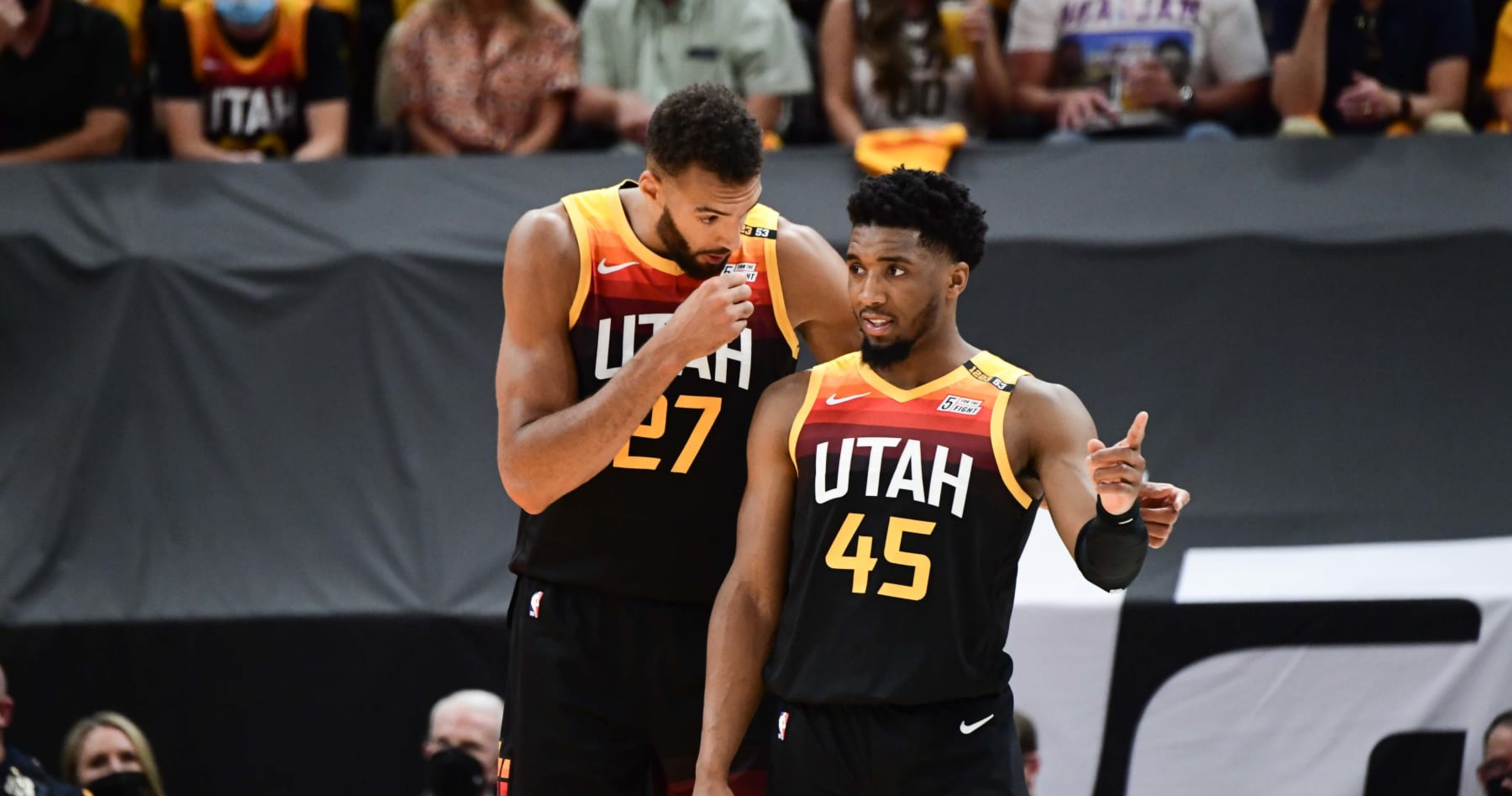Sports
The Best NBA Teams of the Last 5 Years Not to Win a Title – Bleacher Report

The last five NBA titles were won by the Toronto Raptors, Los Angeles Lakers, Milwaukee Bucks, Golden State Warriors and Denver Nuggets.
The absence of a repeat champion is one indication of the league’s seemingly growing parity. Another is the quality of some of the teams that haven’t gone all the way.
To determine the best of that bunch, we looked at four different regular-season numbers:
All 150 teams from the last five seasons were ranked in those four numbers and then sorted by the average of those ranks.
Of course, this isn’t a perfect method for determining the best non-title-winning teams of the last half decade. There’s some obvious overlap with the numbers used. It doesn’t take into account playoff performance or highlight individual players.
But the results pass the so-called “sniff test,” and every ranking is also an invitation for debate. You’ll surely think one team or another should be higher or lower on the list, and there are probably good arguments to back you up.
But for today’s purposes, and in an effort to lay the foundation of that debate, here are the top non-championship teams of the last five years.
2018-19 Golden State Warriors (57-25)
This was the last year of the Golden State Warriors’ Kevin Durant era, and they’d clearly taken their foot off the regular-season gas by this point. Still, they won nearly 60 games. And had Durant and Klay Thompson not gotten hurt in the playoffs, they likely would’ve cruised to a third straight title and been ineligible for this list.
2021-22 Memphis Grizzlies (56-26)
This Memphis Grizzlies team was brash, talented and boasted one of the deepest rosters in the league. That season, the Grizzlies’ point differential was actually better when their best player, Ja Morant, was off the floor. That’s how good the Tyus Jones-led bench was. And when they won Game 5 of their second-round series against the eventual champion Warriors by 39 points, it felt like they had a shot to go all the way.
2021-22 Boston Celtics (51-31)
The record for this team doesn’t do it justice. It took some time for first-year coach Ime Udoka’s philosophies to take hold, but once they did, the Boston Celtics looked unstoppable. Following an 18-21 start, Boston went 33-10 with a 13.5 net rating (net points per 100 possessions) that nearly doubled the second-place Phoenix Suns’ 7.2 over the same stretch. Those Celtics had a juggernaut-level defense that ran into a buzzsaw named Stephen Curry in the NBA Finals.
2019-20 Boston Celtics (48-24)
One thing this exercise proves is that the Jayson Tatum- and Jaylen Brown-led Celtics are really good. And this particular version of the team also got strong campaigns from both Kemba Walker and Gordon Hayward. But that season, of course, ended with the irregularity of the NBA’s “bubble” postseason. And Boston had to face Jimmy Butler on his first seemingly unstoppable crusade to the Finals in the Eastern Conference Finals.
2019-20 Los Angeles Clippers (49-23)
In the first season Kawhi Leonard and Paul George played together for the Los Angeles Clippers, the team finished second in the West, was plus-13.2 points per 100 possessions when both stars were on the floor and was up 3-1 on the Denver Nuggets in the second round of the playoffs. Just when it was starting to feel like the Clippers might cruise to the first championship in franchise history, Denver rattled off three straight wins and kicked L.A. out of the bubble.
W%: 8th
SRS: 8th
Rel ORtg: 17th
Rel DRtg: 16th
One last time with Boston, which followed up its Finals loss against the Warriors by posting 2022-23’s best SRS and finishing one win shy of the Milwaukee Bucks for the best record in the league.
Led by Tatum (30.1 points, 8.8 rebounds and 4.6 assists) and Brown (26.6 points, 6.9 rebounds and 3.5 assists), these Celtics were second in NBA in offensive rating and felt like a relatively safe bet to win it all after the Bucks were eliminated in the first round.
Then, the same team that beat Milwaukee (Butler’s Heat) went up 3-0 on Boston in the Eastern Conference Finals. At that point, the Celtics and the tenure of first-year head coach Joe Mazzulla seemed doomed. Then, they pulled us back in with three straight wins before eventually dropping Game 7.
Despite the talent, depth and playoff experience of this group, we maybe shouldn’t have been surprised by the eventual collapse. Boston was heavily reliant on three-point shooting, which can abandon a team at the worst playoff moments. And it was led by a first-year coach who’s younger than starting center Al Horford.
And though Mazzulla may have a bright future on the bench, he was thrust into a difficult position by the abrupt and unexpected firing of Udoka. His top assistant (Damon Stoudamire) left for a college program in the middle of the season. And he had to face perhaps the best coach of this era in Erik Spoelstra in the conference finals.
The Celtics being as good as they were in 2022-23 feels like an accomplishment when put in the right context.
W%: 2nd
SRS: 1st
Rel ORtg: 38th
Rel DRtg: 1st
An unintended theme of this slideshow is the postseason prowess of Spoelstra, Butler and the Heat, who don’t have an official entry on the list because they’re so much worse in the regular season.
The Bucks, despite boasting one of the best relative defensive ratings in NBA history, were knocked out in just five games by the Heat in the bubble’s second round. And they were doomed by the same thing that’s caused them postseason issues for much of the half decade in question.
Over these five seasons combined, Milwaukee is second in both regular-season offensive rating and regular-season true shooting percentage. Over the same stretch, the Bucks’ playoff offensive rating is 16th. Their playoff true shooting percentage is 18th.
In the postseason, when the game slows down and defenses are able to (as Stan Van Gundy might put it) form a wall in front of Giannis Antetokounmpo, his struggles as a jump shooter can become far more pronounced.
In that second-round series against Miami, Antetokounmpo was 24-32 in the restricted area and 7-of-29 everywhere else (not to mention 22-of-41 at the free-throw line). And the Bucks scored 100.4 points per 100 possessions when he was on the floor and 109.8 when he was off.
W%: 1st
SRS: 5th
Rel ORtg: 23rd
Rel DRtg: 6th
During the Phoenix Suns’ last full season before their depth was gutted for the KD trade, they were plus-11.0 points per 100 possessions when Chris Paul, Devin Booker and Mikal Bridges were all on the floor.
One year after losing to Giannis and the Bucks in the 2021 Finals, that trio (plus Cameron Johnson, Deandre Ayton and a handful of solid role players) looked determined to exact its revenge on the entire NBA.
Booker, specifically, had what was almost certainly the best two-way campaign of his career to that point. He put up 26.8 points, 4.8 assists, 2.7 threes and 1.1 steals, while shooting a career-high 38.3 percent from deep on the way to a First Team All-NBA nod.
But the lasting image from this campaign for both Phoenix and its star is probably Luka Dončić wryly smiling up at a stone-faced Booker during Game 7 of the Western Conference Semifinals.
After cruising to 60-plus wins in the regular season and going up 3-2 on Luka’s Dallas Mavericks, the Suns were absolutely punked by the Slovenian playmaker and his teammates.
Phoenix lost Game 6 in Dallas by 27 points, and then dropped Game 7 at home by 33. Over the entire series, Dončić averaged 32.6 points, 9.6 rebounds and 6.0 assists in an complete domination of Booker.
W%: 4th
SRS: 3rd
Rel ORtg: 15th
Rel DRtg: 3rd
As you can see from the ranks above, this version of the Bucks followed a similar blueprint to the 2019-20 team, but a better offense pushed them higher up the list.
They were second in threes per game, first (by almost a full percentage point) in two-point percentage and led by what may have been the most efficient scoring campaign of Giannis’ career.
On the way to his first MVP, Giannis averaged 27.7 points with a 64.4 true shooting percentage (and the best relative true shooting percentage of his career). But that postseason, he went through something we saw from him again in 2021-22 and 2022-23.
In the 2019 playoffs, his true shooting percentage dipped by more than seven points from his regular-season mark. And during the six-game Eastern Conference Finals loss to the Toronto Raptors, it fell all the way to 51.8.
That, in combination with a postseason run for the ages from Kawhi (who averaged 29.8 points, 9.5 rebounds, 4.3 assists, 2.2 steals and 1.0 blocks in that series) sent these Bucks packing.
W%: 5th
SRS: 2nd
Rel ORtg: 5th
Rel DRtg: 11th
For most of the Utah Jazz’ short-lived Rudy Gobert-and-Donovan Mitchell era, the team was a regular-season wins machine.
Over Gobert and Mitchell’s five combined years together, Utah led the league in simple rating system and was fourth in win percentage.
And of those teams, none felt more ready for a potentially deep playoff run than the 2020-21 squad.
That season, they were top five in both offensive and defensive rating and first (by a long shot) in net rating. Gobert won Defensive Player of the Year, and Mitchell averaged 26.4 points and 5.2 assists.
The defense was highly switchable and anchored by the best rim protector of his generation. And the offense surrounded the Mitchell-Gobert pick-and-roll with tons of shooting (the Jazz set the all-time record for threes per game that season).
It was seemingly a complete team.
And then the Clippers (who didn’t even have Kawhi for the final two games of the series) completely exposed Utah’s lack of perimeter defense in the second round of the playoffs.
After the Jazz went up 2-0, L.A. played tons of small-ball, routinely flew past the first line of resistance and left Gobert to defend both the driver headed to the rim and the small-ball 5 waiting for kickouts to the three-point line. He understandably couldn’t be in both places at once, and Utah dropped four straight in a series that signaled the beginning of the end for this duo.









